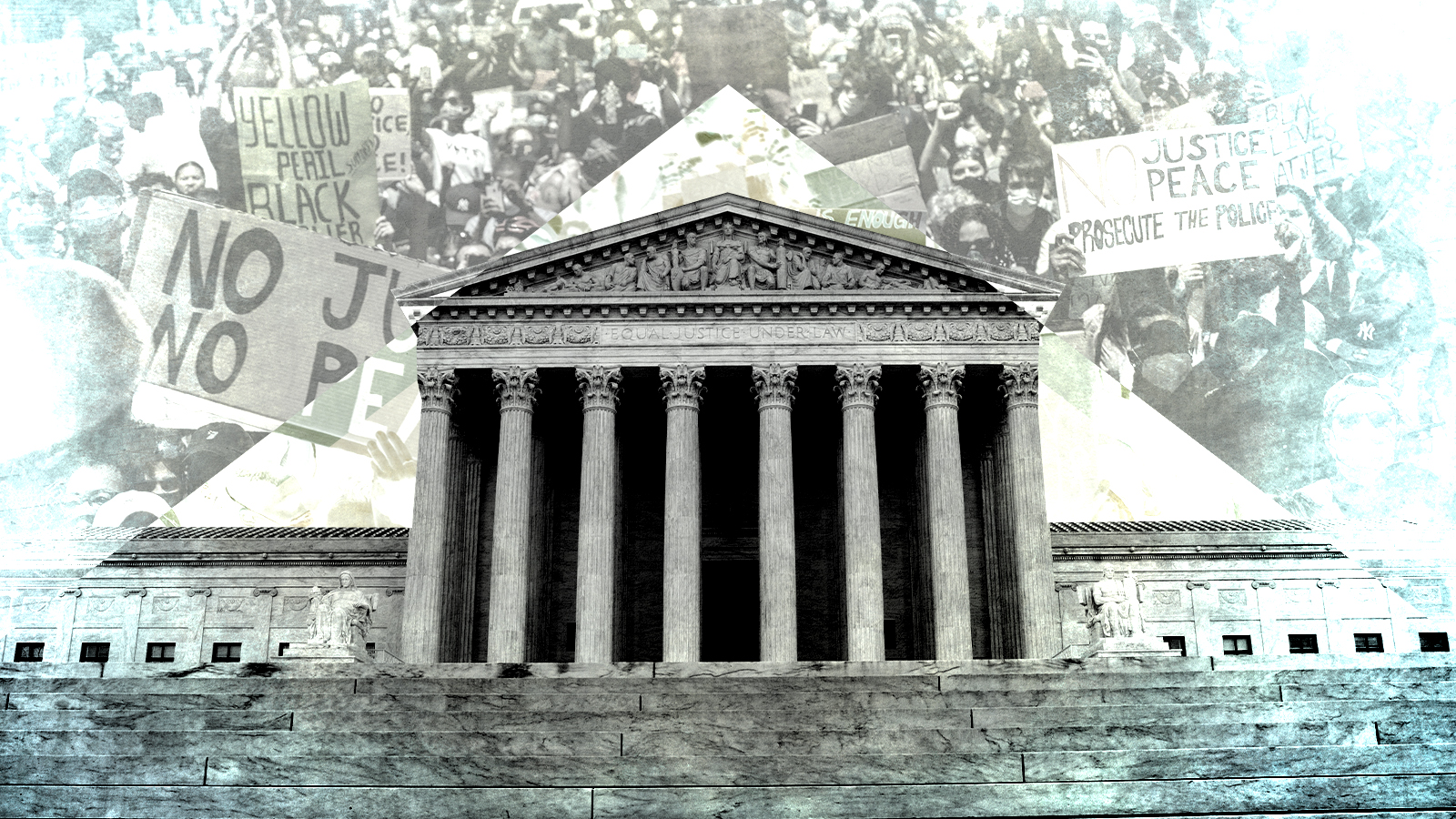The policing problem SCOTUS could fix — but won't


A free daily email with the biggest news stories of the day – and the best features from TheWeek.com
You are now subscribed
Your newsletter sign-up was successful
For a while in 2020, "there was some hope that the Supreme Court might walk back its 50-year jurisprudence on qualified immunity, the doctrine that makes it nearly impossible to recover damages when police violate the Constitution," The Washington Post's Radley Balko noted last week. There was political momentum on the issue after the murder of George Floyd by Minneapolis police — I wrote about this at the time — and, as Balko recalls, "the court ruled last term in favor for the plaintiffs in two cases involving horrific abuse by prison guards."
Last month, however, SCOTUS unanimously overturned two appeals court decisions, granting qualified immunity to officers in use-of-force cases in Oklahoma and California. And on Monday, the court declined to hear Frasier v. Evans, a case in which police officers in Denver violated the First Amendment rights of a man, Levi Frasier, who was recording their conduct, including "officers hitting [a] suspect in the face and knocking a pregnant woman onto the ground."
Here's a summary of key facts of the case from Cato Institute attorney Jay Schweikert:
The Week
Escape your echo chamber. Get the facts behind the news, plus analysis from multiple perspectives.

Sign up for The Week's Free Newsletters
From our morning news briefing to a weekly Good News Newsletter, get the best of The Week delivered directly to your inbox.
From our morning news briefing to a weekly Good News Newsletter, get the best of The Week delivered directly to your inbox.
[T]he City of Denver had instructed its officers on the right to record police since 2007, and the defendants here had taken a course covering exactly this subject just a year before the incident. The record also plainly supported the conclusion that the officers' subjective motive was retaliation against Frasier for recording them: one of them yelled "Camera!" as Frasier recorded them using force on an arrestee; the officers followed Frasier to his van and demanded both his identification and the video; they threatened to arrest him after he refused to volunteer his video; they illegally searched his tablet for the recording; and they let him leave only when they thought he did not have any video recording of them. [Jay Schweikert via Unlawful Shield]
If that seems like unlawful conduct for which law enforcement officers, of all people, should be held to account, well, welcome to frustration about qualified immunity — and about the Supreme Court's apparent refusal to correct this problem of the court system's own making.
A free daily email with the biggest news stories of the day – and the best features from TheWeek.com
Bonnie Kristian was a deputy editor and acting editor-in-chief of TheWeek.com. She is a columnist at Christianity Today and author of Untrustworthy: The Knowledge Crisis Breaking Our Brains, Polluting Our Politics, and Corrupting Christian Community (forthcoming 2022) and A Flexible Faith: Rethinking What It Means to Follow Jesus Today (2018). Her writing has also appeared at Time Magazine, CNN, USA Today, Newsweek, the Los Angeles Times, and The American Conservative, among other outlets.
-
 The environmental cost of GLP-1s
The environmental cost of GLP-1sThe explainer Producing the drugs is a dirty process
-
 Greenland’s capital becomes ground zero for the country’s diplomatic straits
Greenland’s capital becomes ground zero for the country’s diplomatic straitsIN THE SPOTLIGHT A flurry of new consular activity in Nuuk shows how important Greenland has become to Europeans’ anxiety about American imperialism
-
 ‘This is something that happens all too often’
‘This is something that happens all too often’Instant Opinion Opinion, comment and editorials of the day
-
 Big-time money squabbles: the conflict over California’s proposed billionaire tax
Big-time money squabbles: the conflict over California’s proposed billionaire taxTalking Points Californians worth more than $1.1 billion would pay a one-time 5% tax
-
 Supreme Court upholds California gerrymander
Supreme Court upholds California gerrymanderSpeed Read The emergency docket order had no dissents from the court
-
 Did Alex Pretti’s killing open a GOP rift on guns?
Did Alex Pretti’s killing open a GOP rift on guns?Talking Points Second Amendment groups push back on the White House narrative
-
 Washington grapples with ICE’s growing footprint — and future
Washington grapples with ICE’s growing footprint — and futureTALKING POINTS The deadly provocations of federal officers in Minnesota have put ICE back in the national spotlight
-
 Trump’s Greenland ambitions push NATO to the edge
Trump’s Greenland ambitions push NATO to the edgeTalking Points The military alliance is facing its worst-ever crisis
-
 Why is Trump threatening defense firms?
Why is Trump threatening defense firms?Talking Points CEO pay and stock buybacks will be restricted
-
 The billionaires’ wealth tax: a catastrophe for California?
The billionaires’ wealth tax: a catastrophe for California?Talking Point Peter Thiel and Larry Page preparing to change state residency
-
 How robust is the rule of law in the US?
How robust is the rule of law in the US?TODAY’S BIG QUESTION John Roberts says the Constitution is ‘unshaken,’ but tensions loom at the Supreme Court
